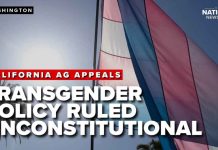
A transgender cyclist’s celebration of a conservative activist’s assassination has ignited a firestorm, raising questions about sports integrity and political expression.
Story Highlights
- Transgender cyclist Chelsea Wolfe celebrated Charlie Kirk’s assassination on social media.
- USA Cycling distanced itself from Wolfe, clarifying her lack of current affiliation.
- Debate intensifies over transgender athletes in women’s sports and political activism.
- Recent bans restrict transgender participation, impacting athletes like Wolfe.
USA Cycling’s Official Response to Wolfe’s Controversy
USA Cycling has swiftly responded to Chelsea Wolfe’s controversial social media posts celebrating the assassination of conservative activist Charlie Kirk. Wolfe, a transgender BMX cyclist and former Olympic team alternate, faced public disavowal from USA Cycling, which clarified that Wolfe has not been affiliated with the national team since 2023. The organization emphasized that the views expressed by Wolfe do not reflect those of USA Cycling.
This decision comes amid ongoing debates over the inclusion of transgender athletes in women’s sports. Wolfe’s provocative comments have sparked widespread criticism and further polarized opinions on the issue. The controversy highlights the challenges faced by sports organizations in balancing fair competition, individual expression, and compliance with federal regulations.
The Impact of Transgender Athlete Policies
The controversy surrounding Wolfe is part of a broader narrative involving the participation of transgender athletes in female sports categories. In 2023, Wolfe’s competitive cycling career ended after the Union Cycliste Internationale (UCI) prohibited transgender women from competing in female categories. This ruling, along with recent U.S. legislation signed by President Trump, has further restricted transgender participation, citing concerns about fairness and competitive integrity. These policies have been met with mixed reactions from various stakeholders, including advocacy groups and sporting bodies.
While some argue these measures are necessary to ensure fair competition, others see them as discriminatory. Wolfe has been vocal in criticizing these bans, calling them abrupt and lacking scientific basis. As the debate continues, the personal and professional ramifications for athletes like Wolfe remain significant.
Broader Implications and Future Outlook
The fallout from Wolfe’s social media activity and the resulting response from USA Cycling underscores the complex intersection of sports governance, political expression, and transgender rights. This incident may lead to further scrutiny and potential tightening of policies governing transgender athletes. The ongoing investigation into Charlie Kirk’s assassination, which Wolfe commented on, adds another layer of complexity to the situation.
USA Cycling and other sports organizations must navigate these challenges carefully, balancing the need for fair competition with the rights and well-being of all athletes. As the sports community and the public continue to engage in this contentious debate, the implications for transgender athletes, such as potential exclusion and loss of opportunities, are profound. The controversy also highlights the broader societal and political divides that influence sports policy and governance.
Sources:
U.S. Olympic Bans Transgender List of All Athletes Who Can’t Compete in Women’s Sports Events
Chelsea Wolfe’s Story and Controversies
USA Cycling Bans Transgender Athletes from Female Categories
USA Cycling Responds After Transgender Olympic Alternate Celebrates Charlie Kirk’s Assassination


